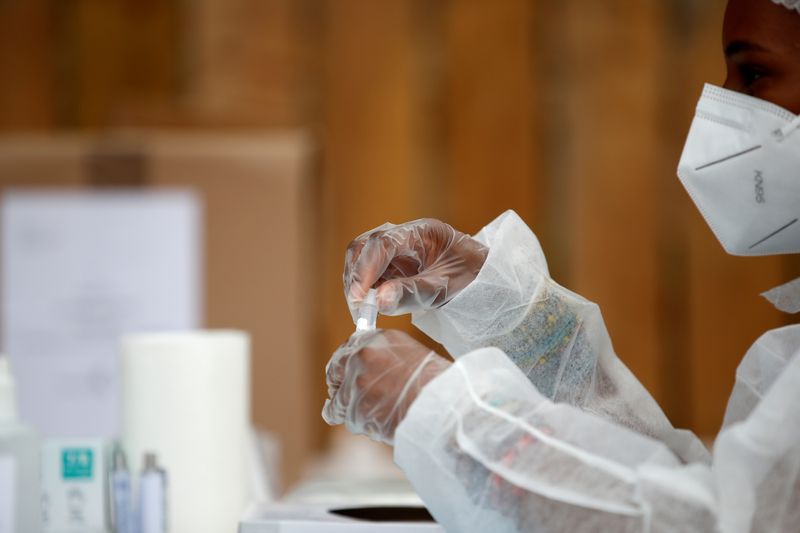(Bloomberg) -- Record Covid-19 cases in Japan and overseas are increasing the risk of the economy losing recovery momentum and even shrinking again as the spread of infections complicates the government’s plans to support growth.
Lockdowns overseas and renewed concerns over the virus at home already appear to be impacting activity in Japan’s economy, according to PMI data released Friday. The figures showed a faster rate of contraction in both the manufacturing and service sectors.
While the likelihood of a double-dip contraction in Japan still isn’t the main scenario for economists, the outside risk of one is growing as the near-term outlook continues to look far from clear even after encouraging vaccine test results.
The surge in infection cases makes Shinichiro Kobayashi, chief economist at Mitsubishi UFJ (NYSE:MUFG) Research & Consulting Co., wonder if he needs to cut his current forecast for zero growth in the first quarter of 2021.
“Just a little push will be enough to bring Japan into a double dip,” Kobayashi said Friday, a day after Tokyo raised its virus alert to the highest level and nationwide cases hit another daily record. “It’s becoming acutely clear that the government isn’t able to contain virus cases while boosting economic activity.”
On Friday, the capital reported 522 new cases, topping 500 for a second straight day. Local media reported daily cases remained high in other areas, including a fresh record in Hokkaido.
Just as growing infections in Japan present a double-dip tail risk for Japan, soaring case numbers overseas could also bode ill for the world economy.
“A second wave of infections is slowing down the recovery; it is losing momentum,” Kristalina Georgieva, managing director of the International Monetary Fund, said of the global economy at Bloomberg New Economy Forum.
IMF, G-20 Warn Recovery May Be Derailed, Risks Still Very High
Most economists still expect Japan’s growth to continue, but at a much slower pace. The economy surged an annualized 21.4% in the previous quarter after a record slump during a nationwide state of emergency in April and May.
Prime Minister Yoshihide Suga’s government and the Tokyo metropolitan authorities have so far held back from any major tightening of voluntary restrictions, despite the uptick in infections. While there seems to be very little appetite for calling another state of emergency, the possibility is growing that some measures will need to be taken.
Suga has called for a third extra budget to keep the economy on a growth path, but the spread of infections makes it difficult for him to simply rely on his Go-To-Travel campaign.
The domestic travel subsidies have been one of the government’s most successful stimulus tools, but they could end up contributing to the spread of the virus if they are extended or expanded or if guidelines aren’t observed.
The program is also weighing on inflation. Figures out Friday showed key consumer prices falling at the fastest pace in more than nine years, driven down partly by the travel discounts.
Mitsumaru Kumagai, chief economist at Daiwa Institute of Research Ltd. and an adviser to Suga, estimates the impact of the campaign at 3.6 times the initial cost, resulting in a 4.9 trillion yen boost to the economy over time. That growth prop could have less impact if the program needs to be downsized or withdrawn.
Japan Needs New Green Fund in Extra Budget, Suga Adviser Says
About 40 million people used the Go-To-Travel program between July 22 to Oct. 31 to the tune of about 209 billion yen ($2 billion), according to Japan Tourism Agency.
Kumagai warns that another nationwide emergency lasting a month would shave 3.3 trillion yen off gross domestic product and push up unemployment by 1.2 percentage points.
